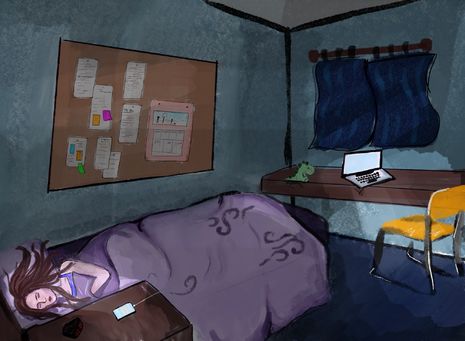To Sleep or Not to Sleep
Reflecting on her personal relationship with sleep, Rowena Field explores the culture of stress-related insomnia

I’m no stranger to a sleepless night.
As a foolish fresher, a Thursday morning outing was not enough to deter me from a Wednesday Cindies, before then having to face a day of lectures and the library. Never had I realised more the importance of a full eight hours, let alone the mental and physical anguish of a paltry three, as I blundered to the boathouse and then down the Cam.
In the depths of lockdown number three, I cannot help but wish to have that all back again. Although far from a regimented routine (chaotic at best I’d say), it was at least some semblance of a routine. Just about sustainable enough for eight weeks at a time, the comedown at the end of each term felt satisfying enough to glorify the slog.
At the moment I am again struggling with my sleep schedule, but not for reasons nearly as gratifying as last year. I feel as though I am being stretched at both ends: neither being able to fall asleep nor wanting to get up, which has created a vicious cycle of self-sabotage in place of the vivacity of my normal life.
“I want to control my sleep because it seems like a smaller, more manageable task.”
With everything being closed, my existence has been reduced down to the confines of the four walls of my house, with a (weather dependent) run once a day and a trip to the shops (if I’m lucky). I may as well be telling the time with one of Dalí’s clocks; some days are over before I’ve even blinked, while others drag out for an eternity. The invasion of technology into every aspect of my life has done little to help this feeling. Online term, online lectures, online resources: the omnipresence of glaring screens is beginning to feel almost aggressive, and this is before Week One has even started. Does it really matter what time I get to bed, or what time I get out of bed, if my waking hours solely consist of such monotony?
After doing this for nearly a fortnight, I am beginning to show all the signs that it does, in fact, matter. It is more than the bags under my eyes - I feel volatile, ill-tempered, and have next to no ability to focus. However, it is not without a whole new set of problems that I try to reset myself back into a recognisable routine. More often than not recently, I lie in bed counting how many hours of sleep I will get if I fall asleep right now. Of course, this is probably the most unhelpful thing I could do. I keep myself up as I stress about not yet being asleep, knowing that the longer it takes me, the more the next day will be sapped of happiness and productivity without those eight precious hours of shuteye.
While trying to see how other people cope when they’re in such a situation, I ended up trawling through a list of ‘ten products guaranteed to help you sleep better’. I experienced a disturbing instance of self-reflection. The problem is not my lack of a weighted blanket (the pressure is meant to reduce cortisol, and thus stress and anxiety), humidifier (people typically find dry winter air more uncomfortable to sleep in) or alarm clock which mimics the rise and fall of the sun. The problem for me, like for so many others of our generation, is the pressure I put on myself to constantly be productive in order to succeed.
“This culture of stress-related insomnia is pervasive across ages and occupations.”
As we all know, sleep is crucial to allow you to do things the next day. It, therefore, seems obvious that to sleep better is also to do better; whether that be more, faster, happier… the list goes on. Putting an obsession like this into the rigorous work environment of Cambridge is like pouring petrol on an open flame – the result being the productivity crisis so many of us say we experience, where the feeling of not doing enough is enough to numb us into doing nothing at all.
I have come to realise that my worries about my circadian rhythm have less to do with my sleep and rest. Instead, my fears stem from something more daunting; they come from everything which rests on my rest. I want to control my sleep because it seems like a smaller, more manageable task than controlling the intensity with which everything else is going on at the minute. Those are eight hours which should be mine, that no one should be able to take away. And being mine, I should be able to control these hours successfully, right? I convince myself that if I can just do that right, the rest of my problems should subsequently fall into place. This time is a reinvestment I can make in myself, in order to continue functioning as I aspire to.
The Guardian reported that sleep loss caused by worrying rose from one in six to one in four adults during the first lockdown back in March. The stress caused by a term’s work pales in comparison to the all-encompassing stress which Covid has laid on us. It feels somewhat trivial to complain about juggling my weekly essays through a few extra cups of coffee, when others are consumed with worry about the health of elderly, vulnerable, or key-worker relatives, or with job security, or financial burdens, or childcare, or family problems, or contracting Covid themselves. I am one of the lucky ones. Yet, this culture of stress-related insomnia is pervasive across ages and occupations. It really shouldn’t come as a surprise that a quarter of us are suffering stress-induced sleeplessness. Can we really be blamed for being so sleep-obsessed, when so much of the past year has made us feel as though we were already living a nightmare?
 Features / Beyond the porters’ lodge: is life better outside college?24 February 2026
Features / Beyond the porters’ lodge: is life better outside college?24 February 2026 News / Cambridge academics sign open letter criticising research funding changes22 February 2026
News / Cambridge academics sign open letter criticising research funding changes22 February 2026 Theatre / Footlights Spring Revue? Don’t Mind if I Do!25 February 2026
Theatre / Footlights Spring Revue? Don’t Mind if I Do!25 February 2026 News / Cambridge and Manchester Universities meet for innovation partnership26 February 2026
News / Cambridge and Manchester Universities meet for innovation partnership26 February 2026 Fashion / The evolution of the academic gown24 February 2026
Fashion / The evolution of the academic gown24 February 2026










![How to Create an Attractive Freelancer Portfolio [5 Tips & Examples]](https://www.varsity.co.uk/images/dyn/ecms/320/180/2026/02/vitaly-gariev-ho2tNOWZYXM-unsplash-scaled.jpg)